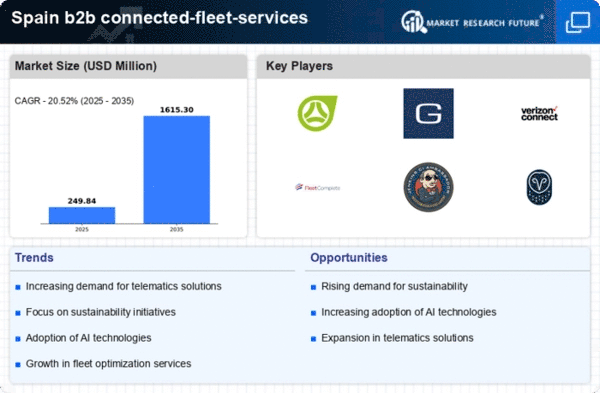Rising Demand for Fleet Optimization
The b2b connected-fleet-services market in Spain is experiencing a notable rise in demand for fleet optimization solutions. Companies are increasingly seeking ways to enhance operational efficiency and reduce costs. This trend is driven by the need to manage fuel consumption, maintenance schedules, and driver performance effectively. According to recent data, businesses that implement connected fleet services can achieve up to 20% savings in operational costs. The integration of advanced telematics and real-time data analytics allows fleet managers to make informed decisions, thereby improving overall productivity. As competition intensifies, the emphasis on optimizing fleet operations is likely to propel the growth of the b2b connected-fleet-services market in Spain.
Shift Towards Electrification of Fleets
The transition towards electrification is becoming a pivotal driver in the b2b connected-fleet-services market in Spain. With the growing emphasis on sustainability and reducing carbon footprints, many businesses are exploring electric vehicles (EVs) as part of their fleet strategy. The Spanish government has set ambitious targets for EV adoption, aiming for 5 million electric vehicles on the road by 2030. This shift not only aligns with environmental goals but also presents opportunities for fleet operators to utilize connected services that enhance the management of electric fleets. The integration of EVs into fleet operations is expected to create new avenues for growth within the b2b connected-fleet-services market.
Increased Focus on Safety and Compliance
Safety and compliance are becoming paramount concerns for businesses operating in the b2b connected-fleet-services market in Spain. The implementation of stringent regulations regarding driver safety and vehicle maintenance is driving companies to adopt connected fleet solutions. These solutions provide real-time monitoring of vehicle conditions and driver behavior, ensuring adherence to safety standards. Recent statistics indicate that fleets utilizing connected services can reduce accident rates by up to 30%. As businesses prioritize safety and compliance, the demand for connected fleet services is likely to surge, further propelling the growth of the market in Spain.
Advancements in IoT and Connectivity Technologies
The rapid advancements in Internet of Things (IoT) and connectivity technologies are significantly influencing the b2b connected-fleet-services market in Spain. The proliferation of IoT devices enables seamless communication between vehicles and fleet management systems, facilitating real-time data exchange. This technological evolution allows fleet operators to monitor vehicle performance, track assets, and optimize routes more effectively. As connectivity improves, businesses are increasingly recognizing the value of data-driven insights in enhancing operational efficiency. The ongoing development of IoT solutions is expected to drive innovation within the b2b connected-fleet-services market, creating new opportunities for growth and competitive advantage.
Government Initiatives Supporting Digital Transformation
In Spain, government initiatives aimed at promoting digital transformation are significantly impacting the b2b connected-fleet-services market. Policies encouraging the adoption of smart technologies and digital solutions are fostering an environment conducive to innovation. The Spanish government has allocated substantial funding to support the development of smart mobility solutions, which includes connected fleet services. This financial backing is expected to enhance the capabilities of fleet operators, enabling them to leverage advanced technologies for better service delivery. As a result, the b2b connected-fleet-services market is likely to benefit from increased investments and a supportive regulatory framework, driving further growth in the sector.
















